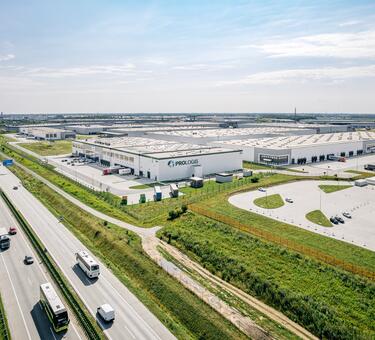Prologis 2025 Supply Chain Outlook Report is out
- Two-thirds of senior executives in the U.S., Germany, and the U.K. are concerned about challenges to the global supply chain, and 86% say economic and geopolitical pressures are influencing their decisions regarding the location of warehouses and factories, according to a report prepared for Prologis, the global leader in logistics real estate.
- 85% of surveyed executives believe that sustainability initiatives enhance their companies' competitiveness.
- Senior managers see significant potential in automation and AI, with 87% stating that automation improves working conditions and reduces burnout.
According to the “Prologis 2025 Supply Chain Outlook Report,” conducted by The Harris Poll, businesses are bracing for a “polycrisis,” a term referring to the convergence of challenges including economic and political instability, high demand volatility, and climate change. The survey, which gathered insights from over 1,000 senior executives in the U.S., U.K., and Germany, confirms that companies must be flexible and resilient to meet the challenges of the global market.
Rising Pressure on Supply Chains
The post-pandemic landscape has placed the entire logistics sector under strain. In the “Prologis 2025 Supply Chain Outlook Report,” 66% of managers expressed concerns about supply chain issues. A substantial 86% of respondents indicated that economic and geopolitical pressures impact their decisions on the location of production facilities and warehouses. Additionally, 70% of respondents acknowledged that it is challenging to select the optimal location for supply chain investments that maximize profits and mitigate risks.
Sustainability and Shaping the Future
Investing in sustainability is one way for businesses to adapt to changing conditions. Companies that invest in environmentally friendly and climate-conscious solutions not only improve their image but also boost their competitiveness. The report prepared for Prologis reveals that 85% of managers view sustainability as an opportunity to gain a competitive edge, and 79% believe the shift to alternative energy sources is progressing too slowly and needs to accelerate within the next 24 months. Nearly all respondents emphasize the importance of their organizations achieving long-term sustainability goals.
“Companies are increasingly focused on sustainable supply chains to strengthen brand reputation, meet ESG goals, and satisfy the expectations of consumers and business partners. Growing environmental awareness among stakeholders, as well as EU and national regulations, impose obligations on businesses in this area. We’re seeing an increasing number of inquiries from clients about energy-efficient warehouses. At Prologis, we made the decision several years ago that all new buildings in Poland would meet the BREEAM Excellent certification requirements. We are also modernizing existing buildings to achieve the highest standards,” said Paweł Sapek, SVP, Regional Head for Central Europe at Prologis.
Automation and Artificial Intelligence
Automation is revolutionizing logistics, enabling companies to significantly increase efficiency and reduce costs. An increasing number of businesses are implementing innovative solutions that streamline processes, enhance workplace safety, and accelerate product time-to-market. According to the survey commissioned by Prologis, 87% of respondents believe that automation in the supply chain improves working conditions and reduces burnout by allowing machines to take on monotonous, repetitive tasks.
Another tool that enables businesses to respond actively to a dynamically changing economic and geopolitical environment is artificial intelligence. Advanced algorithms allow companies to effectively predict future trends, analyze data in real time, and create scenarios to better prepare for future challenges. Nearly 80% of respondents reported “considerable external pressure to implement AI to maintain competitiveness.” However, despite numerous benefits, 94% of company representatives acknowledge facing obstacles in implementing artificial intelligence. Key challenges include data security, data quality, as well as the complexity of implementation processes and change management.
“In these rapidly changing times, logistics real estate companies must deliver value that extends far beyond just the warehouse building. At Prologis, we offer our partner companies solutions through the Prologis Essentials platform, which provides tailor-made solutions to help businesses adapt to changing conditions. The range of services is extensive and supports customers at all stages of their warehouse operations, from moving into a new facility to daily operations. These services range from basic offerings, such as providing shelving systems, to complex projects like implementing intelligent process management systems, robotics, lighting upgrades, and installing electric vehicle charging systems,” explained Paweł Sapek.
The “2025 Prologis Global Supply Chain Outlook” report highlights a profound transformation underway in supply chain management. According to respondents, artificial intelligence (81%), automation (81%), intelligent data analytics (80%), and sustainable solutions (79%) are key elements set to revolutionize supply chain management.
About the Study
The survey was conducted by The Harris Poll on behalf of Prologis from September 4 to 19, 2024, with a sample of 1,025 directors in key roles within their companies. It includes insights from 508 directors in the U.S., 263 in the U.K., and 254 in Germany, providing an international perspective on the challenges and opportunities shaping supply chain management. The survey includes respondents from companies with more than 250 employees, with one-third of participants working in organizations with annual revenues exceeding $2 billion.
